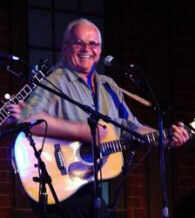join the World Folk Music Assocation's Friend of Folk Music

Ailment Sidelines Bob Shane
After 47 years as the driving force behind the Kingston Trio, Bob Shane’s health has forced him to leave the group indefinitely. Shane, 70, suffered a heart attack March 21. He has quit smoking and is recovering at home in Phoenix. His doctors have ruled out any long distance travel for the time being.
Shane’s slot in the Trio is being filled by Bill Zorn, formerly of the Limeliters and New Christy Minstrels. Zorn was part of the New Kingston Trio with Shane from 1972-’76. “They’ve had just a a fantastic response,” says Shane. “They’re just doing a wonderful job and they’re doing a lot more songs.”
Shane is still receiving oxygen as part of his recovery. He says his heart trouble was triggered by a grueling travel schedule -- criss-crossing the country three times in eight days. “It just caught up with me,” he says. “Time goes by: 47 years on the road is enough.” “I miss it in the sense of what I’ve done for so long,” he says. “I miss the ego blast of being an entertainer.”
He says that the reviews of the trio lineup with Zorn, Bob Haworth and George Grove have been outstanding, though. The group has been well received and is fulfilling all of the Kingston Trio bookings on the calendar, he says. “As long as you make the music sound good, that's what counts,” Shane says. “As long as you’re honest with the music.”
The Trio shift also has contributed to personnel changes in the Limeliters. Founding member Alex Hassilev has reformed his trio with tenor Mack Bailey and bassist Andy Corwin, formerly of the southern California-based folk/comedy quartet the Foremen. Former Limeliter Rick Dougherty and Dick Foley, an original member of the Brothers Four, have teamed with Glenn Yarbrough to form Glenn Yarbrough and the Folk Reunion. Those readers who have been keeping scorecards at home will remember that Dougherty succeeded Red Grammer in the Limeliters. Grammer succeeded Yarbrough in the original Limeliters lineup. The Folk Reunion will give Yarbrough a chance not only to perform his solo hits but also to revive some of the material he performed with the Limeliters in a trio format.
Planning has been under way for almost a year for the World Folk Music Association's 20th annual benefit weekend concert at the Birchmere Music Hall in Alexandria, Jan. 14 and 15, 2005.
Christine Lavin and Modern Man are just two of a host of artists who plan to appear in what promises to be one of WFMA’s most memorable events ever. More details will come in the fall, when ticket sales will be announced. Plans are to make use of the Holiday Inn in Crystal City again as the headquarters hotel, base of operations and location for the Saturday night reception.
Many WFMA favorites will perform. The concert committee is keeping the theme of the show and some artists’ identities under wraps, though, to add to the element of surprise in January.
The 20th annual benefit weekend will likely present more artists than usual in the Birchmere show, simply because so many performers who have appeared in past years want to take the stage to help WFMA celebrate its 20th anniversary. Volunteers for ground transportation, ushering and sales also will be needed for this concert. For those who have always wanted to take part in the behind-the-scenes work that goes into producing this event, this is the year to make it happen. Details about volunteering will be presented in the fall.
CD Reviews by Jay Votel

David Roth
Think Twice
Wind River
It’s a good thing David Roth put together two discs for this, his seventh release on Wind River records. The Chicagoan who was a Kerrville New Folk winner in 1986 and a top vote-getter for Falcon Ridge’s “Most Wanted” 10 years later tackles some pretty tough material with his stirring, touching, topical songs on the first disc -- homophobia, bullying, racism, cancer and September 11. You could almost call it David Roth’s “Handbook for Getting Along in the Folk Tradition for the 21st Century.”
It’s pretty heady stuff -- well executed, and definitely not from the current school of songwriter introspection. But it is also the kind of music that makes a listener wonder -- can this guy be for real? Here are 14 tracks of some very deep, wise and sweet original songs. These are all “accessible,” in the current parlance of songwriting. It means that they tell a pretty coherent story that a listener can identify with easily. He even does a somber solo on the triple-chambered ocarina, an earthy flute-like instrument that has a haunting sound.
In the second disc, though, he loosens up with some humor, including live tracks and song introductions, with some political observations and further, yet funnier chapters in the aforementioned “handbook,” such as why folks shouldn’t patronize big chain stores or restaurants, or words that just don’t go together -- shades of a George Carlin routine.
By the end of the second disc, a listener gets the sense that he knows this plain-spoken, gentle songwriter and wordsmith pretty well -- and that he makes a good companion for a couple of hours’ listening. For those looking for some moving music and social commentary more along the lines of Peter, Paul & Mary as well as some biting wit, the like of which hasn’t been produced since the days of Tom Lehrer, David Roth is your guy and “Think Twice” is the disc to have.
Some of the backing vocalists are well known in folk circles, too -- Sloan Wainwright, Cindy Mangsen, Penny Nichols, Reggie Harris, Cosy Sheridan and Siobahn Quinn.

The Wailin' Jennys
40 Days
Red House Records
This is the best folk trio record since “Cry Cry Cry” in 1998, hands down.
Canadian singer-songwriters Cara Luft, Nicky Mehta and Ruth Moody together evoke that “greater than the sum of its parts” feeling in 13 tracks.
Unlike the approach taken by “Cry Cry Cry,” these three highlight their own songs -- not songs from other songwriters. They divide the songwriting duties evenly -- each gets credit for three songs. Two of the remaining cuts are traditional and sound it: “Saucy Sailor” and the closing song, “The Parting Glass." The other two are a heart-stopping cover of Neil Young’s “Old Man” and an inscrutable cover of John Hiatt’s “Take it Down.” More on that later.
The record is big on common folk themes, big on big ideas and big on the big sound of three big beautiful voices.
In a word, you could say it’s big.
Nicky Mehta’s beautiful song, “Arlington,” for example, has a universal, traditional feeling in its lyrics -- a sign of a well-crafted song that has considerable staying power. Drawing on simple, natural images, she asks some very deep questions about existence, belief and faith. “Where is your home, restless wind?” she asks. “Is your voice every tree? Your soul of the air?”
Ruth Moody’s “Beautiful Dawn” uses lyrical structure to good advantage with her refrain, “There’s only one way to mend a broken heart.”
And Cara Luft’s simple three-verse “Come All You Sailors” is an elegant example of her ability to take a traditional-sounding theme and turn it into a folk gem.
Now, as to the selection of the John Hiatt song, his declaration that the Stars and Bars of the Confederacy have no place in today’s world, or flying over the South Carolina statehouse, all I can ask is why the Jennys felt compelled to cover it on their first American release? Do they understand the implications of this song? It’s one thing for Indianapolis-born, Nashville-based John Hiatt to sing this song. With him, it has a context, a depth of meaning. It loses a bit of impact re-crossing the Canadian border.
It is the solitary lapse on a brilliant record.

King Wilkie
Broke
Rebel Records
A full band of 20-somethings performing traditional bluegrass —not as some kind of audio punch line, but deep, mossy, from-the-heart-and-out-the-nose bluegrass — now that’s rarer than sunshine in some dark hollow.
And that is King Wilkie, a young band that issued its first widely distributed CD, “Broke,” in mid-April. It comes complete with yodeling and a half-dozen new songs that sound like they were dredged from someone's collection of old 78s.
King Wilkie, named for Bill Monroe’s favorite horse, is creating quite a buzz in bluegrass circles.
The six band members sound like they’ve been honing their chops and harmonies on the back porch for ages. In fact, the two songwriters in the group, guitarist Ted Pitney and mandolin player Reid Burgess, got turned on to the music at a bluegrass festival while they were college students in 2000. Upon graduating the following year, the duo moved to a farmhouse outside Charlottesville, Va., and put together a band.
One instrumental cover serves to bookend the other songs, Ralph Lewis’s “40 West.” It’s a nice touch.
The other covers are astonishing for a band so young — the traditional “Little Birdie,” Jimmie Rodgers’ “Blue Yodel #7,” Billy Cox’s “Sparkling Brown Eyes,” Jimmie Davis’ “Where the Old Red River Flows” and “Some Glad Day,” a Monroe Bros. gospel staple written by Will Ramsey.
But the originals stand up well next to such chestnuts, dealing with traditional bluegrass topics — loneliness, faithless women and death, with a trainwreck thrown in for good measure.
“Lee & Paige,” written by Mr. Pitney, is the short sad story of two 15-year-old star-crossed lovers.
Paige gets her foot caught in the rail and rather than abandon his girl to a horrific death, Lee wraps his arms around her to die with her and the locomotive bears down on them.
It’s a deliciously pitiful song, the kind only bluegrass can serve up well.
Mr. Burgess also picks up on the theme of death and loneliness in “Goodbye So Long,” singing about a man bitter that his life that didn’t turn out as he had planned, merely waiting for his time to come: “Alone he’ll be buried with only his name/No words were spoken and nobody sang.”